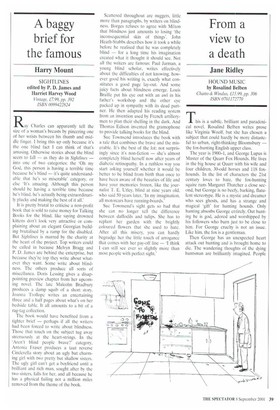A baggy brief for the famous
Harry Mount
SIGHTLINES edited by P. D. James and Harriet Harvey Wood Vintage, .f7.99, pp. 392 ISBN 0099422824 Ray Charles can apparently tell the size of a woman's breasts by pincering one of her wrists between his thumb and middle finger. I bring this up only because it's the one blind fact I can think of that's amusing. Otherwise stories about the blind seem to fall — as they do in Sightlines — into one of two categories: the 'Oh my God, this person is having a terrible time because he's blind — it's quite understandable that he's so miserable' category, or else 'It's amazing. Although this person should be having a terrible time because he's blind, he's actually being extraordinarily plucky and making the best of it all.'
It is pretty brutal to criticise a non-profit book that is sold to raise money for Talking Books for the blind, like saying drowned kittens don't look very attractive or complaining about an elegant Georgian building brutalised by a ramp for the disabled. But Sightlines is marred by the charity at the heart of the project. Top writers could be called in because Melvyn Bragg and P. D. James are behind the enterprise, but because they're top they write about whatever they want. Some write about blindness. The others produce all sorts of miscellanea. Doris Lessing gives a disappointing preview chapter from her upcoming novel. The late Malcolm Bradbury produces a damp squib of a short story. Joanna Trollope writes an entertaining three and a half pages about what's on her bedside table. It all amounts to a bit of a rag-tag collection.
The book would have benefited from a tighter brief — perhaps if all the writers had been forced to write about blindness. Those that touch on the subject tug away strenuously at the heart-strings. In the 'Aren't blind people brave?' category, Antonia Fraser produces a taut reverse Cinderella story about an ugly but charming girl with two pretty but shallow sisters. The ugly girl can't get a boyfriend until a brilliant and rich man, sought after by the two sisters, falls for her, and all because he has a physical failing not a million miles removed from the theme of the book.
Scattered throughout are nuggets, little more than paragraphs, by writers on blindness. Borges refuses to agree with Milton that blindness just amounts to losing 'the inconsequential skin of things'. John Heath-Stubbs describes how it took a while before he realised that he was completely blind — for a long time his imagination created what it thought it should see. Not all the writers are famous: Paul Jarman, a young blind scholar, writes effectively about the difficulties of not knowing, however good his writing is, exactly what constitutes a good page lay-out. And some juicy facts about blindness emerge. Louis Braille put his eye out with an awl in his father's workshop and the other eye packed up in sympathy with its dead partner. He then adapted his reading system from an invention used by French artillerymen to plan their shelling in the dark. And Thomas Edison invented the gramophone to provide talking books for the blind.
Sue Townsend introduces the book with a tale that combines the brave and the miserable. It's the best of the lot: not surprisingly since it's non-fiction — she's almost completely blind herself now after years of diabetic retinopathy. In a ruthless way you start asking yourself whether it would be better to be blind from birth than once to have been aware of the beauties of life and have your memories frozen, like the journalist T. E. Utley, blind at nine years old, who said 50 years later, 'In my imagination, all motorcars have running-boards.'
Sue Tow-nsend's sight gets so bad that she can no longer tell the difference between daffodils and tulips. She has to replant her garden with the brightly coloured flowers that she used to hate. After all this misery, you can hardly begrudge her the little touch of arrogance that comes with her pay-off line — '1 think I can still see ever so slightly more than most people with perfect sight.'


































































 Previous page
Previous page